| |

|
DeLoG NEWSLETTER
No. 52 – 11/2020
|
|

|
| |
|
|
| |
Dear Reader,
welcome to issue No. 52 of the DeLoG Newsletter which showcases the Network’s and its members and partners most recent activities and offers an overview of current news stories, upcoming events and courses. In addition, it includes a carefully curated selection of recent publications related to DeLoG’s core topics: - Decentralisation and Local Governance (DLG) in Contexts of Fragility, Migration and Post-Conflict Settings,
- Fiscal Decentralisation and Local Finance,
- Localising the 2030 Agenda and
- Urban and Territorial Governance.
In our “In-Profile” section, we introduce you to Angela Sima and RoAid, one of DeLoG’s newest members since the Network’s Annual Meeting in July. As RoAid focal point for DeLoG, Angela shares her personal perspective on Romanian Development Cooperation and her thoughts on becoming the 43rd member of the DeLoG Network.
Following DeLoG’s first virtual Annual Meeting in July, during which not only RoAid but also the Network of Associations of Local Authorities of South-East Europe, NALAS, were welcomed as new Network members and partners, a second strategic session was held on the 23rd of September focussing on DeLoG’s future development. During the exchange partners and members agreed that fostering informal as well as in-depth knowledge exchange in these times of crisis need to be at the top of the list.
Through hosting a webinar with the Asian Development Bank and LOGIN Asia on "Creating an Enabling Environment for Localizing SDGs in Asia and the Pacific" and the moderation of Partners for Review’s (P4R) online session on “SDG Monitoring at Different Levels: Local and National Approaches”, DeLoG has taken successful steps toward this goal.
In line with their call for more online activities, various DeLoG members and partners have launched new platforms and networks to facilitate exchanges and identify best practices to cope with the impact of COVID-19 at the local and regional level. Learn all about these and more recent activities in our “News from our Members and Partners” as well as our “Additional News” section with a special focus on initiatives for urban settings to build back better.
We hope you will enjoy this issue and encourage you to forward our Newsletter to others.
All the Best and stay healthy!
Your DeLoG Team
Contact: info@delog.org |
|
|
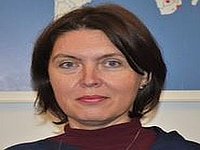
© Angela Sima
|
|
In-Profile – Angela Sima, Romanian Agency for International Development (RoAid)
Since 2018 Angela Sima has been working as an advisor in RoAid’s Programmes Department. She is currently in charge of the organisation’s OECD-DAC relationship and fills the role of RoAid focal point for various international networks like the Practitioners' Network for European Development Cooperation or the DeLoG Network. She has a lot of experience in working with civil society organisations, project management and implementation of development projects. She is a graduate of the Management Faculty of the Academy of Economic Studies of Bucharest.
In her interview she provides us with insights into Romanian Development Cooperation, an overview of RoAid’s work in this context and the organisation’s interest in joining the DeLoG Network.
|
| |
|
|
| |
|
|
|
|
|
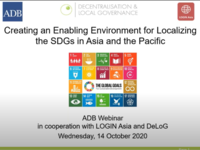
© DeLoG Secretariat
|
|
DeLoG Webinar with ADB and LOGIN ASIA on "Creating an Enabling Environment for Localizing SDGs in Asia and the Pacific" – Recording Now Available
On the 14th of October 2020, the DeLoG Secretariat, the Asian Development Bank (ADB) and LOGIN Asia hosted a webinar focused on SDG enabling environments that allow subnational governments to contribute to the achievement of national SDG strategies. The webinar’s inputs were provided by Edgardo Bilsky, Director of Research, United Cities and Local Governments (UCLG), Barcelona; T.R. Raghunandan, Fiscal Decentralisation Expert, India; Bimal Pokharel, Executive Director of National Association of Rural Municipality in Nepal (NARMIN) and Rachana Shrestha, Public Management Specialist, Governance Thematic Group, Asian Development Bank (ADB). Overall the webinar was attended by 60 participants from 19 countries. The recording of the webinar is now available on the DeLoG Homepage.
|
| |
|
|
| |
|
|
|
|
|
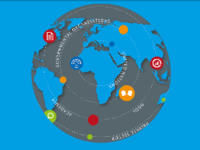
© Partners4Review
|
|
DeLoG Online Session with Partners for Review (P4R) on “SDG Monitoring at Different Levels: Local and National Approaches”
On the 15th of October 2020 from 10:00 am to 11:30 am CEST Partners for Review (P4R) with support from DeLoG hosted a webinar on “SDG Monitoring at Different Levels: Local and National Approaches”. The online session took place within the framework of the Second Virtual Networking Days of P4R, a Transnational Multi-Stakeholder Network for a Robust Review Process of the 2030 Agenda for Sustainable Development.
The objective of the session was to discuss how actors at the sub-national level can support SDG monitoring to close data gaps.
The event was moderated by Christian Luy, coordinator of DeLoG.
|
| |
|
|
| |
|
|
|
|
|
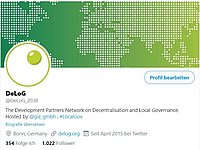
© DeLoG Secretariat
|
|
DeLoG Network Reaches Over 1000 Followers on Twitter
The Development Partners Network on Decentralisation and Local Governance (DeLoG) would like to extend a big Thank You to its 1,022 followers on Twitter. We are very excited about the great interest in our work and decentralisation and local governance as central topics for development cooperation and good governance.
You are not a Follower yet? Then waste no more time and come visit our profile.
|
| |
|
|
| |
|
|
|
|
|
News from our Members and Partners
|
|
|
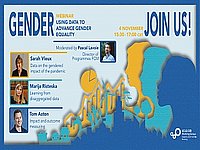
© UCLG-CIB
|
|
UCLG-CIB Webinar on Using Data to Advance Gender Equality
This Wednesday (04.11.2020) the UCLG-CIB Working Group will be hosting its second 2020 Webinar on Gender. Moderated by Pascal Lavoie (Director of Programmes, Federation of Canadian Municipalities) this webinar will focus on gender in international programming and on how data can be used to advance gender equality in this field. Participants will have the chance to exchange with experts on the topics of gendered impacts of COVID-19, disaggregated data in gender activities and measuring gender impact and outcome.
|
| |
|
|
| |
|
|
|
|
|
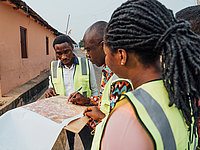
© Elio Stamm
|
|
GIZ Developed Software for District Revenue Management Ranked as Ghana’s Top Digitisation Intervention
Developed through a series of GIZ support projects over the past decade, GIZ’s District Local Revenue (dLRev) software has enabled district assemblies in Ghana to collect their own revenue through e.g. property rates or business operating permits. The software represents a breakthrough in Ghana’s strive towards a more digitised public administration. A recent cost-benefit assessment of the dLRev carried out by renowned experts of the Copenhagen Consensus Centre as part of the Government of Ghana’s ‘Ghana Priorities Project’ has shown that every Ghana cedi invested in the implementation of the dLRev leverages 8.8 Ghana cedis in return. dLRev is currently being implemented in 90 partner districts in Ghana in the framework of GIZ’s Governance for Inclusive Development Programme (GovID).
|
| |
|
|
| |
|
|
|
|
|
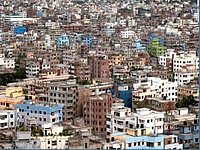
© UNCDF
|
|
UNCDF Sets Up New Technical Assistance Facility (IMIF-TAF) to Support Cities in Accessing the International Municipal Investment Fund
In order to help cities gain access to IMIF project funds, the UNCDF/UCLG/FMDV coalition has decided to provide cities with technical assistance in future via its new Technical Assistance Facility (IMIF-TAF). The IMIF-TAF will assist local governments situated in developing countries with preparing their investment projects of up to USD 25 million for submission to the IMIF. In support of this process, the IMIF-TAF recently published a detailed brochure on their investment process online.
|
| |
|
|
| |
|
|
|
|
|
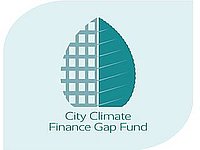
© The World Bank
|
|
Joint Launch of City Climate Finance Gap Fund
“The Gap Fund”, an initiative by the governments of Germany and Luxembourg and the Global Covenant of Mayors for Climate and Energy, will support cities and local governments that face financing obstacles with regard to climate investment projects. The Gap Fund, which is expected to unlock at least € 4 billion for the investment in climate-smart projects and urban climate innovation, will be implemented by the World Bank and the European Investment Bank. With the objective of filling the finance gap especially for cities in developing countries, the fund will focus its efforts on project preparation in the early stages to prevent impasses in the implementation process. To generate more stakeholder involvement, the hashtag #Mindthefinancegap has been introduced on social media.
|
| |
|
|
| |
|
|
|
|
|

© city2city
|
|
UNDP Launches the Urban Networking Platform City2City
Peer-to-peer learning platforms that enable a direct exchange between stakeholders have proven to be of great relevance for the global urban community. Therefore, UNDP recently launched the City2City Platform to provide cities and urban stakeholders with the opportunity of sharing information and practices in the fields of urban economy, city resilience, city governance, climate action, energy and more. By providing an overview of relevant international frameworks, like the 2030 Agenda, and highlighting their impact on cities worldwide, the platform represents an innovative instrument for local urban communities.
|
| |
|
|
| |
|
|
|
|
|
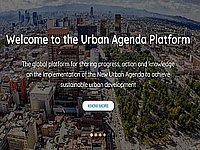
© UN-Habitat
|
|
UN-Habitat Launches New Urban Agenda Platform
Launched recently, UN-Habitat’s new knowledge platform provides key shareholders involved in the implementation of the New Urban Agenda (NUA) with access to voluntary reports, best practices and data for reviewing the progress made on the NUA so far. Dedicated to the 2030 Agenda and specifically SDG 11, the platform provides tools, resources and engagement options. Calling for multi-stakeholder cooperation in the implementation of the New Urban Agenda, it represents an important step toward better stakeholder collaboration.
|
| |
|
|
| |
|
|
|
|
|
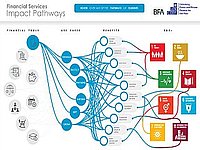
© UNCDF
|
|
UNCDF Launches Impact Pathways: A Tool to Measure the Intricate Role of Digital Finance in Reaching the Sustainable Development Goals
Originally developed as part of the Pacific Financial Inclusion Programme for the benefit of development practitioners, financial institutions and donors, “Impact Pathways” is a tool designed to clarify the link between daily life improvements of low-income populations through their access to financial services. As such, the tool is meant to uncover the “pathways” of specific financial services and their positive contributions to users and one or more SDGs over time.
|
| |
|
|
| |
|
|
|
|
|
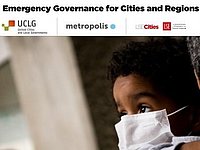
© UCLG-CIB
|
|
UCLG, Metropolis and LSE Cities Launch Emergency Governance Initiative (EGI)
Being able to respond and govern during times of emergency is of crucial importance to national, regional and local governments. Therefore, the Emergency Governance Initiative (EGI) provides urban and regional governments with actionable information, suitable frameworks, knowledge and resources to be accessed in times of crisis. In this context, the EGI has recently published several analytical notes focussed on governance information, and quarterly policy briefs on reform agendas and governance innovations. The newly published second analytical note analyses the COVID-19 responses of local and regional governments worldwide and presents concrete policy innovations from Barcelona, Bogotá, Gauteng and Seoul.
|
| |
|
|
| |
|
|
|
|
|

© UCLG-CIB
|
|
From Social Distance to a World Driven by Communities – UCLG Launches the #CitiesAreListening Initiative
Inspired by the experiences shared and lessons learned from UCLG members on COVID-19 approaches and their vision for the future, this new joint initiative by UCLG, Metropolis and UN-Habitat #CitiesAreListening will unite and provide stakeholders with the opportunity to jointly define priorities and co-create activities for building back better. The initiative is part of UCLG’s Decalogue implementation efforts.
|
| |
|
|
| |
|
|
|
|
|
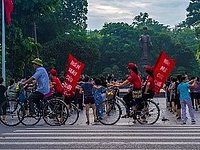
© Asian Development Bank
|
|
Learning Launch Carried out by the Asian Development Bank to Test Urban Solutions in the Real World
Cities are being stress tested more than ever during the current pandemic, spiking the need for innovations that optimise existing city infrastructure and will help finalise long-term urban projects. Therefore, the Asian Development Bank is currently working together with a start-up incubator to carry out a learning launch experience on selected innovative business ideas. The results of the experiment will be shared within the next six months through a report and a webinar on lessons learnt regarding how the principle can be used for investment in future urban projects and initiatives.
|
| |
|
|
| |
|
|
|
|
|
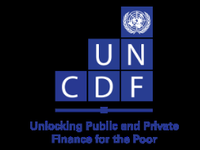
© UNCDF
|
|
Local Government Finance is Development Finance - UNCDF Launches Blog on Local Government Finance
Ever since July 2020 the local development finance team at UNCDF has been blogging about developments in the field of local government finance and local economic development finance. Check out their insights and stories here below.
|
| |
|
|
| |
|
|
|
|
|
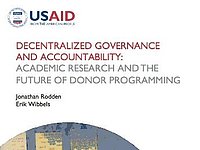
© USAID
|
|
Decentralized Governance and Accountability: Academic Research and the Future of Donor Programming – USAID Publishes Study on Decentralisation
Decentralisation has often been depicted as the prime solution to address both economic inefficiency and bad governance. However, while enthusiasm for decentralisation reform was high during the 1990s, recent voices have focused more on the potentially negative impact of decentralisation programmes on inequality and social cohesion at the local level. Against this backdrop USAID in cooperation with world-renown academic institutions has conducted a study to review experiences and research findings collected throughout the past decades with the aim of informing future development programming in this area. Learn about their results below.
|
| |
|
|
| |
|
|
|
|
|
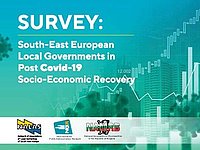
© NALAS
|
|
NALAS Publishes Survey Results on SEE Local Governments in Post COVID-19 Socio-Economic Recovery
Local governments (LGs) have been at the frontline of responding to the COVID-19 pandemic in South-East Europe. In need of innovative and effective strategies for recovery, this survey sheds light on local measures aimed at managing the social, economic and financial dimension of this crisis. The data provides South-East European Local Governments with resources to design strategies fitting their local realities.
|
| |
|
|
| |
|
|
|
|
|
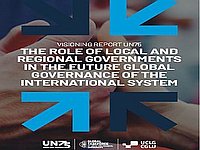
© Global Taskforce
|
|
The Role of Local and Regional Governments in the Future of Global Governance of International System – UN, UCLG and Global Taskforce of Local and Regional Governments Publish UN75 Visioning Report
Advocating for transformation from the Bottom-Up, the UN75 Visioning Report highlights the critical role of Local and Regional Governments (LRG) for ensuring a sustainable future for all. The report discusses LRGs immediate, short- and long-term priorities in terms of securing basic services for all and reducing inequality. Identifying LRGs as key actors in implementing the 2030 Agenda, the report demands that LRGs receive a seat at the UN-table and are included in multi-lateral cooperation efforts.
|
| |
|
|
| |
|
|
|
|
|
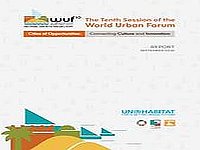
© UN-Habitat
|
|
UN-Habitat Publishes Report on “The Tenth Session of the World Urban Forum”
The tenth session of the World Urban Forum, organised and convened by UN-Habitat and hosted by the city of Abu Dhabi, put culture, creativity and innovation at the centre of the forum. The theme: “Cities of Opportunities: Connecting Culture and Innovation” affirmed culture as an essential component of local identity which must be considered in urban planning and is vital to sustainable development. The newly published report provides a wide-ranging overview of the output generated by the Forum events which recorded over 13,000 participants from 169 countries and more than 30,000 cumulative attendees throughout the week. Representing a platform to capture knowledge, the WUF10-report provides an in-depth presentation of ideas for shared sustainable urban development. The next World Urban Forum is expected to be held 2022 in Poland.
|
| |
|
|
| |
|
|
|
|
|
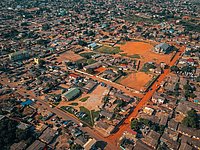
© Global Development Institute
|
|
New African Cities Research Consortium Announced
Researchers from the Global Development Institute have been awarded a research contract of £32 million to establish the African Cities Research Consortium (ACRC). Funded by the UK’s Foreign, Commonwealth and Development Office (FCDO) as part of UK Aid, the ACRC brings together partners and international organisations to tackle complex problems in some of Africa’s fastest growing urban areas. The project is scheduled for 6 years and will focus on sustainable urban development in 13 African cities.
|
| |
|
|
| |
|
|
|
|
|
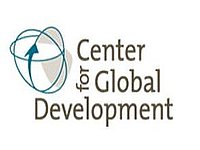
© CGDEV
|
|
Measuring Domestic Resource Mobilization –Thoughts on a New Study by NORAD
CGD research focused on political impediments to increased domestic resource mobilisation (DRM) in developing countries has identified performance measurement as an essential component for success. NORAD’s recent study on measurement tools for DRM therefore comes highly recommended by the CGD for the donor community and developing countries. The CGD plans to draw and build on NORAD’s study for upcoming research.
|
| |
|
|
| |
|
|
|
|
|
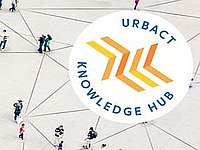
© URBACT
|
|
URBACT's Contribution to the New Leipzig Charter
In preparation for the signing of the New Leipzig Charter in December 2020, URBACT, in collaboration with EUROCITIES and UIA, has organised four City Labs in the last two years to draw on the direct experience of hundreds of cities and inform the process of the development of the Charter. Based on this exchange, URBACT has created the URBACT Knowledge Hub which provides cities with good practices, stories and documentation from the City Labs.
|
| |
|
|
| |
|
|
|
|
|
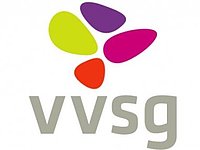
© VVSG
|
|
VVSG Concludes Three Pilot Projects on Localising the SDGs: Approaches and Les-sons Learned Now Published
|
| |
|
|
| |
|
|
|
|
|
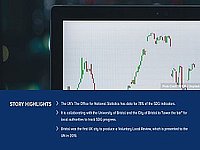
© M.B.M. / Unsplash
|
|
Bristol UK Pilots Local Version of SDG Data Tool
The University of Bristol, in partnership with the City of Bristol’s ‘OneCity’ Office, produced the UK’s first ever city Voluntary Local Review (VLR). It was presented to the UN in 2019. Drawing on this process a city version of the ‘Open SDG’ platform has now been piloted in order to help local authorities access data and report on the SDGs and also provide insight on sub-national SDG progress in the UK. In this context, the UK’s national statistical office is collaborating with city authorities and academics in Bristol to make local data “more accessible and meaningful” for local authorities and UK citizens.
|
| |
|
|
| |
|
|
|
|
|
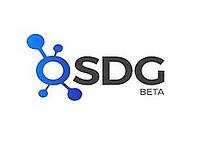
© technote
|
|
New Open-Source Tool: Assign SDGs to Scientific Content
OSDG is an open-source tool which can be used free of charge to assign SDG labels to scientific contributions like studies or publications. The app can be used intuitively by users, regardless of their research background, and does not require coding experience. The objective of the newly launched tool is to provide a comprehensive, single framework for classifying the SDGs.
|
| |
|
|
| |
|
|
|
|
|
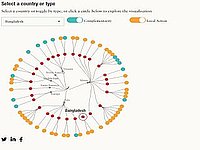
© ODI
|
|
COVID-19: Tracking Local Humanitarian Action and Complementary Partnerships – A New Tool by ODI
Designed by ODI’s Humanitarian Policy Group (HPG) as part of its extended “Integrated Programme Plus”, the “Covid-19: tracking local humanitarian action and complementary partnerships” mapping tool illustrates how local actors have been involved in COVID-19 response measures and identifies changes in the humanitarian system and in practice at different government levels. The tool’s goal is to enable more local leadership, local humanitarian action and complementarity by using and tracing the local government data.
|
| |
|
|
| |
|
|
|
|
|
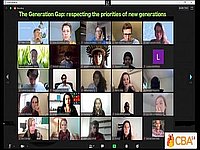
© IIED
|
|
Taking stock of CBA 14: Local Must Lead Action to Tackle World’s Multiple Interconnected Challenges
The 14th International Conference on Community-based Adaptation (CBA) was held online from the 21st to the 25th of September 2020. Uniting over 500 participants from over 70 countries, the event focused on innovative solutions for the urgent and complex challenges faced by vulnerable communities in the Global South. Calling for transformation and policymaking that recognises local priorities and intra-community differences and long-term commitments, the CBA14’s participants emphasised the importance of local action to build back better globally.
|
| |
|
|
| |
|
|
|
|
|
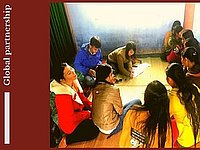
© United Nations
|
|
UN World Data Forum: “Making Voices Heard and Count“ – Leave No One Behind Partnership to Support Community-driven Data for the SDGs
The Leave No One Behind Partnership Project was founded to raise awareness for missing data regarding the needs of marginalised groups in official monitoring statistics. The project’s goal is to give marginalised groups a voice and agency, especially the new generation, in the SDG implementation process by using community-driven data to improve the inclusivity of public services and policies. The project’s homepage showcases how the initiative combines locally owned data with a concerted advocacy effort and creates a resource to be used when addressing key stakeholders of the SDG process at the national and international levels.
|
| |
|
|
| |
|
|
|
|
|
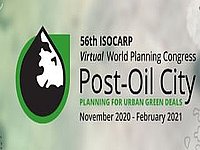
© city2city
|
|
The 56th ISOCARP World Planning Congress
When: 07 November 2020 – 04 February 2021
Where: Online
Apply by: Registration open
Open to members and non-members alike, ISOCARP’s 56th Congress provides international urban and regional planners with a platform to exchange with decision-makers as well as urban and planning stakeholders. This year’s focus of the conference will be on the future of post-oil cities and planning for urban green deals.
|
| |
|
|
| |
|
|
|
|
|
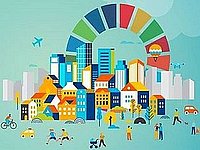
© OECD
|
|
3rd OECD Roundtable on Cities and Regions for the SDGs
When: 16 - 17 November 2020, 12:00 pm - 03:00 pm CET
Where: Online
Apply by: 6 November 2020
The event, hosted by the OECD Centre for Entrepreneurship, SMEs, Regions and Cities (CFE) and the County of Viken (Norway), builds on the results of the 1st and 2nd OECD Roundtable. Uniting key stakeholders from cities, regions, national governments, the private sector, civil society, academia, philanthropy and international organisations, the 3rd Roundtable will focus on “The SDGs as a framework for long-term COVID-19 recovery strategies in cities and regions.”
|
| |
|
|
| |
|
|
|
|
|
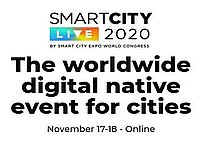
© city2city
|
|
Smart City World Expo 2020
When: 17 – 18 November 2020
Where: Online
Apply by: Registration open
Smart City Live will be hosted as a two-day online forum, bringing together international high-level professionals from cities and companies. Having identified the topic of adaption of urban mobility for safe and sustainable travel as a key priority to be discussed, this year the Smart City community will connect virtually due to COVID-19.
|
| |
|
|
| |
|
|
|
|
|
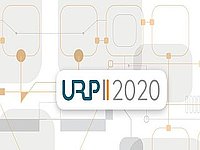
© URP2020
|
|
URP 2020: Sustainable & Resilient Urban-Rural Partnerships
When: 25 - 27 November 2020
Where: Online
Apply by: Registration open
Uniting scientific insight with projects on the ground, this year’s conference provides a platform for learning from the regional to the broader European context. Participants will have the unique chance to exchange ideas on sustainable and resilient regional development and support the design of solutions for current and future urban-rural challenges.
|
| |
|
|
| |
|
|
|
|
|
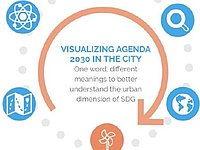
© UNDP
|
|
Venice City Solutions 2030 – Visualizing Agenda 2030 in The City
When: 26 November 2020 – 27 November 2020
Where: Hybrid Format (online and in Venice, Italy)
Apply by: TBA
Co-organised by UCLG together with its Italian section AICCRE, UNDP, UN-Habitat and the UN SDG Action Campaign, Venice City Solutions 2030 is a yearly event to advance the implementation of the SDGs on the local level.
|
| |
|
|
| |
|
|
|
|
|
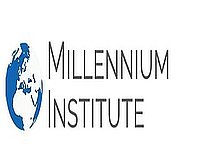
© Millenium Institute
|
|
System Dynamics-based Development Planning
When: January - April 2021 (exact dates TBA)
Where: Online
Apply by: 20 November 2020
|
| |
|
|
| |
|
|
|
|
|
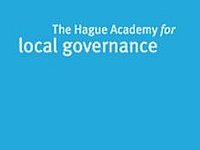
© The Hague Academy for Local Governance
|
|
Fiscal Decentralisation and Local Finance
When: 8 - 19 February 2021
Where: Online
Apply by: 01 January 2021
|
| |
|
|
| |
|
|
|
|
|

© The Hague Academy for Local Governance
|
|
Inclusive Service Delivery & the SDGs
When: 1 – 12 March 2021
Where: The Hague, Netherlands
Apply by: 22 January 2021
|
| |
|
|
| |
|
|
|
|
|

© The Hague Academy for Local Governance
|
|
Citizen Participation and Inclusive Governance
When: 15 – 26 March 2021
Where: The Hague, Netherlands
Apply by: 5 February 2021
|
| |
|
|
| |
|
|
|
|
|
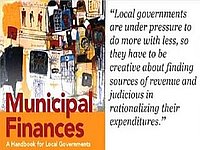
© The World Bank Academy
|
|
Municipal Finances – A Learning Program for Local Governments (Self-paced)
When: Self-paced
Where: Online – The World Bank Academy
Apply by: Registration open
|
| |
|
|
| |
|
|
|
|
|
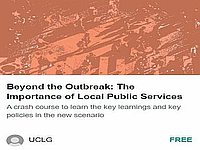
© UCLG
|
|
Beyond the Outbreak - The Importance of Local Public Services (ENG, ES, FR)
When: Self-paced
Where: Online – UCLG Learning
Apply by: Registration open
|
| |
|
|
| |
|
|
|
|
|
Knowledge
|
|
|
Fragility ● Post-conflict Settings ● Migration
|
|
|
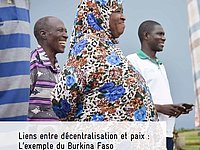
© Deutsche Gesellschaft für Internationale Zusammenarbeit (GIZ) GmbH
|
|
Decentralisation and Peace: The Case of Burkina Faso (in French)
This study is the result of a GIZ appraisal mission in Burkina Faso. It draws on information derived from internal programme analyses, interviews and discussions with local and central state actors as well as advisors from two BMZ-funded missions of the Decentralisation and Communal Development Programme (PDDC) to propose new strategies and adjustments of German development cooperation projects in the field of decentralisation and governance to counteract stronger condition of fragility in the country.
Authors: Jerome Schroth, Benjamin Scheffzik, Manuel Wollschlaeger
Publication Date: 2020
Copyright: Deutsche Gesellschaft für Internationale Zusammenarbeit (GIZ) GmbH
|
| |
|
|
| |
|
|
|
|
|

© The Hague Academy for Local Governance
|
|
Building Safe Communities: Bridging the Gap Between Citizens, Municipalities & the Police
Developed as part of the “Matra project on Local Safety and Security in Albania 2017 – 2020”, this handbook describes local pilot projects for increasing citizen safety in Berat, Cërrik, Devoll, Mat and Roskovec. Besides providing a detailed overview of the projects’ achievements, the guidebook lists concrete policy recommendations for other Albanian municipalities and civil servants to address local safety and security issues. Additionally, the guide provides national policy makers with recommendations on how to support municipalities in their efforts to promote local safety.
Publishers: The Hague Academy for Local Governance; VNG International; Foundation for Local Autonomy and Governance
Publication Date: 2020
Copyright: The Hague Academy for Local Governance; VNG International; Foundation for Local Autonomy and Governance
|
| |
|
|
| |
|
|
|
|
|
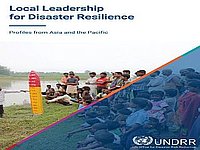
© UNDRR - Regional Office for Asia and Pacific
|
|
Local Leadership for Disaster Resilience: Profiles from Asia and the Pacific
This report highlights the successful contributions of local leaders to long-term community resilience, local SDG-implementation and the achievement of Target E of the Sendai Framework in Asia and the Pacific (“Substantially increase the number of countries with national, and local disaster risk reduction strategies by 2020”). In addition to raising awareness for the context-specific knowledge and access to informal networks of local leaders, the report carves out the important role of local leaders for supporting formal institutions in resilience-building at the local level in times of increased disaster risk in the region.
Authors: Manu Gupta, Vijayalakshmi Viswanathan, SEEDS-India
Publication Date: 2020
Copyright: UNDRR - Regional Office for Asia and Pacific
|
| |
|
|
| |
|
|
|
|
|
Fiscal Decentralisation ● Local Finance
|
|
|
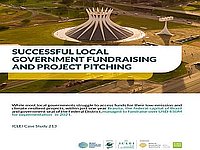
© Olga Tokareva, ICLEI World Secretariat
|
|
Successful Local Government Fundraising and Project Pitching
|
| |
|
|
| |
|
|
|
|
|
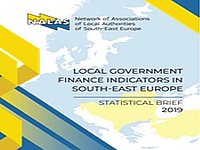
© NALAS
|
|
Local Government Finance Indicators in South-East Europe: Statistical Brief
Part One of this statistical brief by NALAS provides policymakers and analysts with information on the structure and size of local governments in South-East Europe as well as a regional comparison of national and subnational government finance in 2018. Part Two showcases revenues and expenditures for the period 2006-2018, using selected indicators of macro–economic performance and fiscal decentralisation. The publication is the first of its kind, including only quantitative data organised in tables and graphs to allow for easily accessible and comparable country- and region-specific information.
Author: NALAS Task Force on Fiscal Decentralization
Publication Date: 2019
Copyright : NALAS
|
| |
|
|
| |
|
|
|
|
|
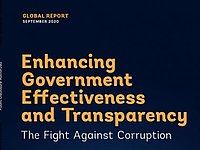
© International Bank for Reconstruction and Development / The World Bank
|
|
Enhancing Government Effectiveness and Transparency: The Fight Against Corruption
Against the backdrop of the current pandemic, this report recognises the possible threat of corruption for uncontrolled emergency fund and government spending. Organised along various topics, the report looks into corruption in different sectors and functions and uses diverse case studies to highlight the dynamics at play between national and local governments. Additionally, key instruments for addressing corruption are documented.
Authors: Bernard C. Myers, Rajin Bajpai
Publication Date: 2020
Copyright : International Bank for Reconstruction and Development / The World Bank
|
| |
|
|
| |
|
|
|
|
|
2030 Agenda ● Localising the SDGs
|
|
|
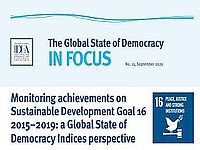
© International IDEA
|
|
Monitoring Achievements on Sustainable Development Goal 16 2015-2019: A Global State of Democracy Indices Perspective
This new report by International IDEA analyses the progress made on SDG 16 using the Global State of Democracy Indices data. The progress of the indicators and targets is compared globally and regionally and judged country-specific dependent on local context. The stark difference between the global decline and increase in improvements of the various targets highlights the role that subnational, regional and local governments play for implementing the SDGs.
Authors: Armend Bekaj, Annika Silva-Leander
Publication Date: 2020
Copyright: International IDEA
|
| |
|
|
| |
|
|
|
|
|
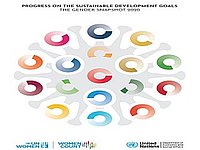
© UN-WOMEN
|
|
Progress on the Sustainable Development Goals: The Gender Snapshot 2020
Showcasing the latest available data on gender equality across all Sustainable Development Goals (SDGs), the 2020 edition of “Progress on the Sustainable Development Goals: The gender snapshot” analises recent achievements as well as current declines in the field of gender due to COVID-19. Underscoring the motto of leaving no woman or girl behind, the report identifies the most vulnerable groups across all SDGs and serves as a reminder that female representation matters more than ever if the global community aims to build back better and more resilient
Publisher: UN WOMEN
Publication Date: 2020
Copyright: UN-WOMEN
|
| |
|
|
| |
|
|
|
|
|
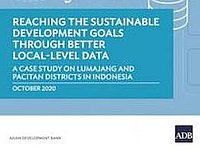
© Asian Development Bank
|
|
Reaching the Sustainable Development Goals through Better Local-Level Data: A Case Study of Lumajang and Pacitan Districts in Indonesia
This new case study provides insight into ADB’s collaborative project of using data dashboards to monitor the localisation of SDGs in East Java, Indonesia. The project recognises the impact of good data access for a flexible and context-specific SDG implementation and aims to enable local governments to address their communities’ needs in the process. The project builds on a series of local governance reforms which received support through the Kinerja project focused on accountability mechanisms and strengthening local policy dialogue.
Publisher: Asian Development Bank
Publication Date: 2020
Copyright: Asian Development Bank
|
| |
|
|
| |
|
|
|
|
|
Urban and Territorial Governance
|
|
|
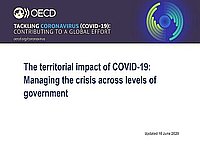
© OECD
|
|
The Territorial Impact of COVID-19: Managing the Crisis Across Levels of Government
Besides identifying the regional and local impact of COVID-19 as extremely heterogeneous, this report provides an in-depth look at the consequences of the pandemic for the health/social, economic and fiscal dimension of OECD countries’ regions and municipalities. The brief provides good practice examples on how to alleviate and manage the pandemic’s territorial effects, and its implications for multi-level governance, subnational finance and public investment as well as examples for improving regional resilience.
Publisher: OECD
Publication Date: 2020
Copyright: OECD
|
| |
|
|
| |
|
|
|
|
|
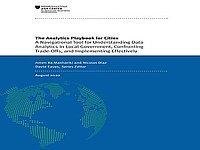
© Ash Center for Democratic Governance and Innovation - Harvard Kennedy School
|
|
The Analytics Playbook for Cities: A Navigational Tool for Understanding Data Analytics in Local Government, Confronting Trade-Offs, and Implementing Effectively
|
| |
|
|
| |
|
|
|
|
|
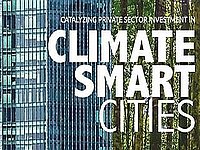
© The World Bank
|
|
Catalysing Private Sector Investment in Climate Smart Cities
To fill the financing gap and catalyse private sector investment in climate-smart city projects and infrastructures, innovative instruments are required. Based on literature reviews, this report not only identifies key obstacles which hinder needed investments, but documents innovative financial instruments for private sector financing for low carbon, resilient urban investments.
Authors: Sandrine Boukerche, Lauren Carter
Publication Date: 2020
Copyright: The World Bank Group
|
| |
|
|
| |
|
|
|
|
| |
|
|
| |
For access to even more inspiring publications on
1. DLG in Contexts of Fragility, Migration and Post-Conflict Settings,
2. Fiscal Decentralisation and Local Finance,
3. Localising the 2030 Agenda or
4. Urban and Territorial Governance
make sure to visit the regularly updated "Knowledge Section" of our DeLoG Website!
|
|
|

















































